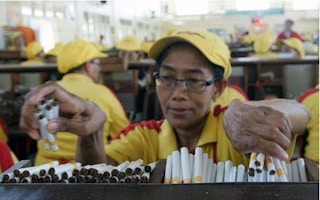Today is International Women’s Day, and on this auspicious day we call out the tobacco industry for the exploitation and pain it inflicts on the lives of millions of women around the world. More than 2 million women die from tobacco use every year, of whom 70 per cent live in low and middle income countries.
To continue reading, subscribe to Eco‑Business.
There's something for everyone. We offer a range of subscription plans.
- Access our stories and receive our Insights Weekly newsletter with the free EB Member plan.
- Unlock unlimited access to our content and archive with EB Circle.
- Publish your content with EB Premium.
While Philip Morris International, British American Tobacco and Japan Tobacco International beat their drums about securing awards including certificate for equal pay, diversity, gender equality and WeQual, millions of women working for the tobacco industry in developing countries toil in appalling working conditions in tobacco farms or rolling cigarettes in factories for low pay.
The STOP project’s factsheet on women and the tobacco industry outlines how women laborers in the tobacco sector are disproportionately affected by the negative environmental, health and social impacts of handling tobacco. Tobacco companies are found to be “addicted” to cheap raw materials which perpetuates poor working conditions on tobacco farms where nearly half of the workers are women. In Indonesia, women constitute the bulk (94 per cent) of workers in the kretek hand-rolling factories.
While the transnational tobacco companies deny compensation to the millions of women who become victims to tobacco use, on the other hand, they spend almost US$1 billion on marketing to lure more women into addiction.
Women in Southeast Asia and globally continue to be targeted by Big Tobacco brands, through “light” and “ultra light” variants, as well as new products such as noncombustible and heated tobacco products. Meanwhile, tobacco companies continue to use CSR handouts to whitewash their image on women’s issues, such as PMI’s support for a workshop for women in tobacco growing areas in Thailand (Nan, Phayao, Roi Et and Maha Sarakham). While tobacco sponsorship of sports has been practically halted around the world, JTI continues to sponsor women’s volleyball.
In Indonesia, PT HM Sampoerna, owned by PMI, hires about 39,200 workers, mostly women, to produce hand-rolled kretek (clove) cigarettes through third party operators. The women roll the cigarettes producing about 325 kretek per hour.
According to a World Bank report, a worker in a large factory can roll 4,000 kreteks per day and earn Rp50,000 ($3.50) or Rp 30,000 ($2.10) for cutting the edge of kreteks. On the other hand, a worker in a smaller firm rolls 1,500 to 2,000 kreteks per day and earns Rp16,000 ($1.12) for rolling or Rp11,000 ($0.77) for cutting the edge of the kreteks. How does this below-poverty wage rate alongside Philip Morris’ rhetoric on equity?
In the Philippines, a Philip Morris’ (PMFTC) contract tobacco grower from Misamis Oriental said: “This is the only plant so far that had me experience various kinds of illnesses. I itched everywhere, and I had headaches afterwards and felt dizzy and intoxicated.’’ She had actually used the protective gear that was provided by the company.
On 1 March, the Philippines National Tobacco Administration (NTA), a government body, launched a celebration of the National Women’s month with a flag-raising ceremony attended by its administrators and senior level officials. The NTA’s way of showing gender equality is to wear purple shirts every Monday and conduct weekly talks on the rights of women and photography contest for its employees.
How to better support women to stop the exploitation and suffering from tobacco? As women eke out a living from producing tobacco, governments should do more to support them and implement the WHO Framework Convention on Tobacco Control. This includes:
- Applying Article 17 to assist women to transition from tobacco to alternate livelihoods;
- Applying a comprehensive ban on all tobacco advertising, promotions and sponsorship including CSR activities;
- Taxing the tobacco industry to recoup health care costs and loss of productivity.
As for the tobacco industry, it must stop marketing its tobacco products and compensate victims for harms caused by tobacco use.
This piece was originally published by Southeast Asia Tobacco Control Alliance (SEATCA) and is republished with permission.








